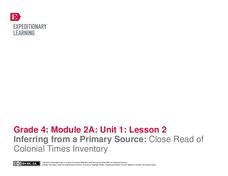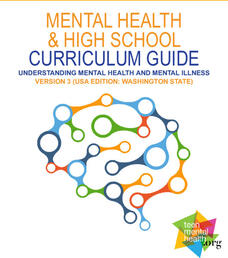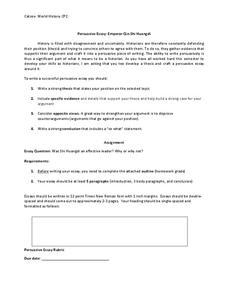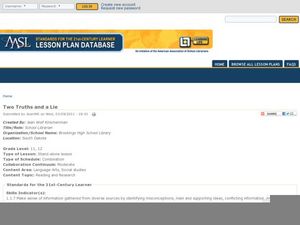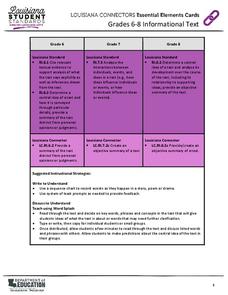E Reading Worksheets
Tone Worksheet 4
A poet's word choice can be the difference between a poem that is merely sad, and a poem full of heartbreaking regret. Middle schoolers discern the tone in four different poems, noting the relevant textual evidence that supports...
E Reading Worksheets
Tone Worksheet 5
A speaker's attitude toward his or her subject matter determines the tone of a piece of literature. Interpret the tone of four different poems, as well as their meanings, with supporting textual details.
EngageNY
Inferring from a Primary Source: Close Read of Colonial Times Inventory
Teach your class about colonial America through an examination of primary documents. First though, start vocabulary notebooks for content-specific and academic vocabulary. Pupils can keep this record during the entire module. Once this...
K12 Reader
What is a Tribal Government?
How are tribal governments similar to local or state governments? After reading a short article on tribal governments, individuals draw evidence from the provided article to respond to this reading comprehension question.
Curated OER
Turning Assets into Action in the Fight Against Hunger
How can one person change the world? Scholars research and analyze the topic of world hunger. Using video clips, parodies, and primary source evidence, they uncover a current campaign to end world hunger. Collaborative groups openly...
Curated OER
(Clues to) Copying the Codes: Examining the Evidence
Students view animations of DNA replication and transcription and complete a worksheet. In this genetics instructional activity, after watching on-line video clips to gather information about DNA replication and transcription, student...
Curated OER
Lesson 3: Exception Questions in Stories with a Flashback
Fourth graders respond to a text using textual evidence to support their answers to questions. Students observe the teacher model a quick warm up on the chronological sequence of events from the passage, Leaving Home. In this literacy...
Portland Public Schools
Opinion: Persuasive Essay Unit Introduction
Opinion, audience, purpose. Fourth graders are introduced to the three characteristics of persuasive writing in the third unit of a year-long writing program. The 98-page packet is complete with plans, model essays, graphic organizers,...
EngageNY
Grade 9 ELA Module 2, Unit 3, Lesson 5
After rereading the full text of Walter Mosley's essay "True Crime," groups complete an evidence collection tool worksheet, and then class members independently draft a multi-paragraph, evidence-based response that identifies how Mosley...
Curated OER
The Achievements and Challenges of Egypt
Awesome, that is all I have to say! This set of lessons provides learners with an understanding of ancient Egyptian laws, lifestyle, religion, and culture. It engages them in a critical analysis activity regarding the film, "The Prince...
Curated OER
To Kill a Mockingbird: End of Novel Critical-Thinking Questions
Chapters 28 – 31 of Harper Lee’s To Kill a Mockingbird are the focus of a series of critical thinking questions. Responders are encouraged to refer directly to the novel to support their inferences and interpretations.
Teacher’s Pet Publications
A Common Core Approach to Teaching Of Mice and Men
Whether or not your school/state has adopted the Common Core standards, you will want to add this resource to your Of Mice and Men curriculum materials. The chapter-by-chapter activities ask readers to provide evidence from the novella...
Mental Health Literacy
Mental Health and High School Curriculum Guide - Version 3
A 171-page curriculum provides educators with the information they need to help and support high schoolers' mental health. The curriculum targets five domains: learning how to maintain good mental health, learning about mental disorders...
Cloud Front
Persuasive Speech Graphic Organizer
Support your learners during the speech-writing process with a five-page graphic organizer. Pupils have plenty of space to write in their evidence and arguments on this resource. The organizer provides some prompts for each section to...
EngageNY
TASC Transition Curriculum: Workshop 15
What do a cheetah, Audi commercial, and air have in common? They're all topics of an engaging inquiry-based, hands-on workshop for educators about background knowledge, reading strategies, the CER model, and argumentative writing. The...
Curated OER
Persuasive Essay
Next time you assign your young historians to write a persuasive essay, use this document as a starting point and support them with a rubric, tips for writing a successful persuasive piece, and a general essay outline.
College Board
Teaching Students How to Write AP Statistics Exam Responses
But this is math—we don't need to know how to write! The article makes a point that class members in AP® Statistics should be comfortable writing as the exams require it. Individuals quickly realize that quality writing is crucial...
Great Books Foundation
Discussion Guide for Little Women
Start with the question in mind with a discussion activity on Louisa May Alcott's Little Women. With four focus questions, note-taking prompts, and discussion points, readers practice answering thematic questions based on textual evidence.
Soft Schools
Practice with Poetry
William Shakespeare's Sonnet 138 is the focus of a reading comprehension exercise that asks readers to answer to five questions using evidence drawn from the poem to support their response.
EngageNY
Group Discussions and Revision: Editorial Essay
Great minds think aloud! Pupils participate in the Fishbowl protocol, discussing their opinions about the Mary River mine proposal. As they share their thoughts, peers provide feedback about their thesis and supporting ideas.
Curated OER
Two Truths and a Lie: Internet Research Skills
It's tough for high schoolers to assess what is a credible resource and what is not. A helpful resource prompts class members to research a particular topic and record two facts—and create one lie—while documenting the sources. They...
iCivics
Drafting Board: Military Intervention
Should countries use their militaries to stop humanitarian crises in other countries? Learners make claims, organize their reasoning, and provide evidence for their arguments with this rich resource.
Louisiana Department of Education
Essential Elements Cards
Use essential elements cards to help lesson plan! Each card contains an informational text common core standard for grade levels six through eight and suggestions for activities and supports. Cards address skills such as citing textual...
Curated OER
A Colony is Born : Lesson 5 - Dear Mem
Discover colonies! Young historians will listen to a primary source journal entry read aloud with a backdrop of wave sounds. They discuss the entry, add historical facts to a chart and personal insights to another. Then they listen to...




